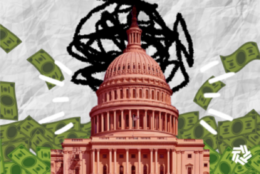Financial Management
-
A congressional report released today outlines $70 billion of unspent federal dollars that could have helped disaster victims, spurred highway construction and fund education programs.
June 07, 2012 -
The White House wants to take a more evidence- based approach to budgeting. That means agencies will have to show a return on the investment on their programs, with more successful programs being more likely to receive funding.
June 05, 2012 -
The leaders of the Senate Homeland Security and Governmental Affairs Committee gave the acting GSA administrator 21 days to answer 41 multi-part questions about the agency's efforts to prevent waste, fraud and abuse following the now infamous Western Regions Conference. Senators also recommended the agency review all other recent GSA conferences for possible problems.
May 15, 2012 -
Danny Werfel, the controller of the Office of Management and Budget, told In Depth with Francis Rose the newly launched Do Not Pay tool makes agencies smarter about making payments.
April 27, 2012 -
On a voice vote, the House backed the Digital Accountability and Transparency Act, known as the DATA Act. The legislation would establish uniform standards for all recipients to report federal money and set up a single website where average Americans could search for information on how government agencies, departments and other recipients spend federal funds.
April 26, 2012 -
The Defense Department estimates its major acquisition programs are costing $1.6 trillion, slightly less than previously estimates.
April 02, 2012 -
The Postal Service has hired Evercore Partners, a New York-based investment bank, to evaluate proposed changes to its operations, compensation and benefits. Evercore has advised General Motors and other large, troubled companies. USPS said it needs to cut annual expenses by $20 billion by 2015.
November 22, 2011 -
For the first time in 20 years, audits reviewed and gave an opinion for every civilian agency. Only DoD doesn\'t have a qualified or clean audit opinion.
November 21, 2011 -
The Pentagon faces an uphill climb in getting ready for an audit of its consolidated financial statements by 2017, outside experts said Thursday. Nonetheless, the goal is achievable if the push is sustained by future secretaries of Defense.
November 18, 2011 -
The White House says federal agencies stopped nearly $18 billion in improper payments in fiscal 2011. Danny Werfel, controller at OMB, explained how agencies did it.
November 16, 2011 -
Most of the fiscal 2011 reductions came from the departments of Education, Agriculture and Health and Human Services. The administration also announced new steps aimed at improving how agencies use suspension and debarment to deal with unreliable contractors and grant recipients.
November 15, 2011 -
Gordon Adams, a professor of international relations at American University and former associate director at the Office of Management and Budget, outlines how draw downs have impacted DoD budgets since World War II.
November 01, 2011 -
Asif Khan, director of Financial Management and Assurance Issues at the Government Accountability Office, outlines some of the challenges the Pentagon faces in order to become auditable by 2017.
November 01, 2011 -
Susan Irving, director for Federal Budget Analysis at GAO, shared the findings from the GAO report, \"The Federal Government\'s Long-Term Fiscal Outlook: Fall 2011 Update.\"
October 28, 2011 -
Last month, the Inspector General of the Department of Justice said the agency spent too much money on conferences, citing $16 muffins as an example. Today, in a revised report, the IG said the muffins didn\'t actually cost that much.
October 28, 2011

